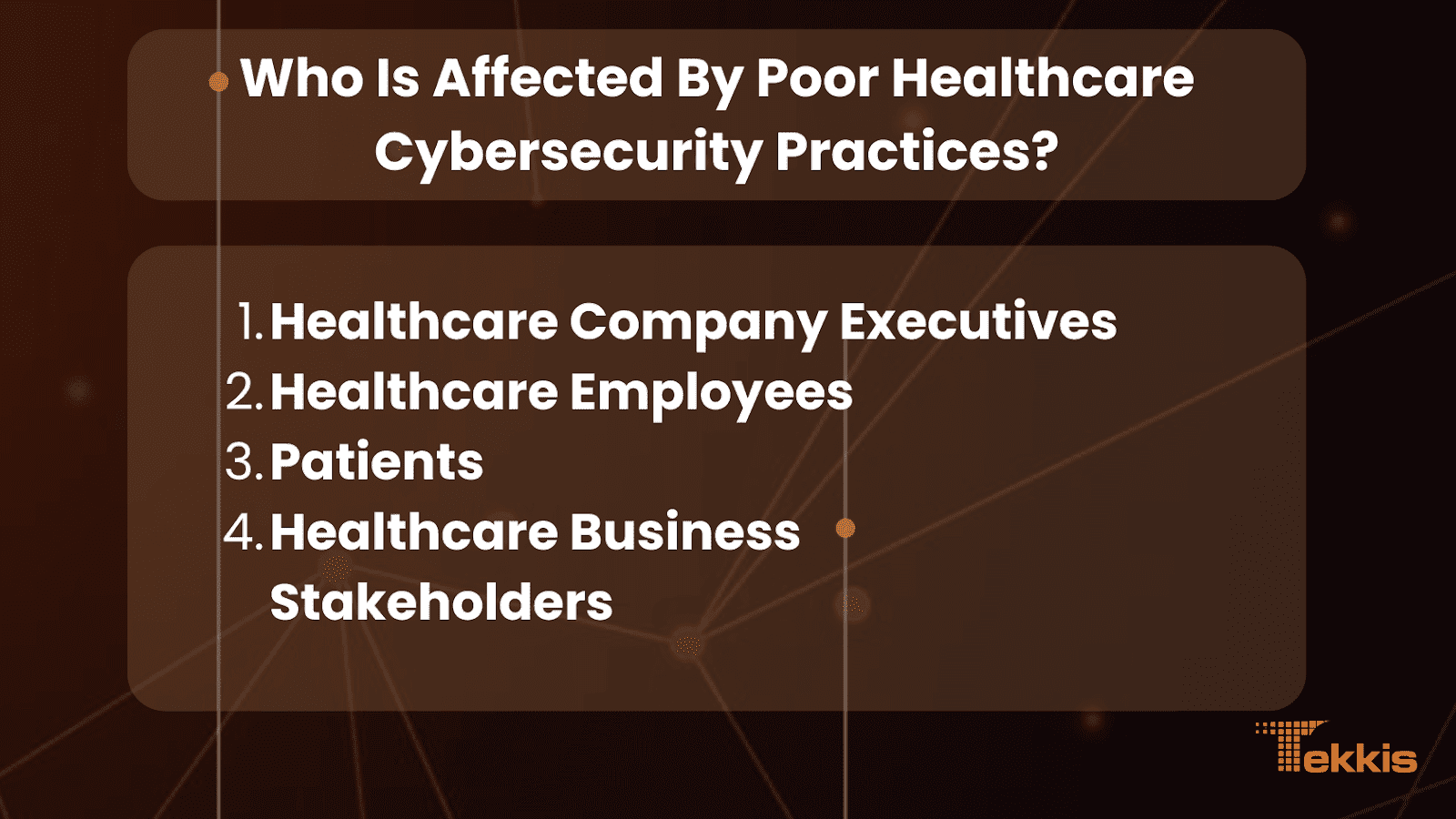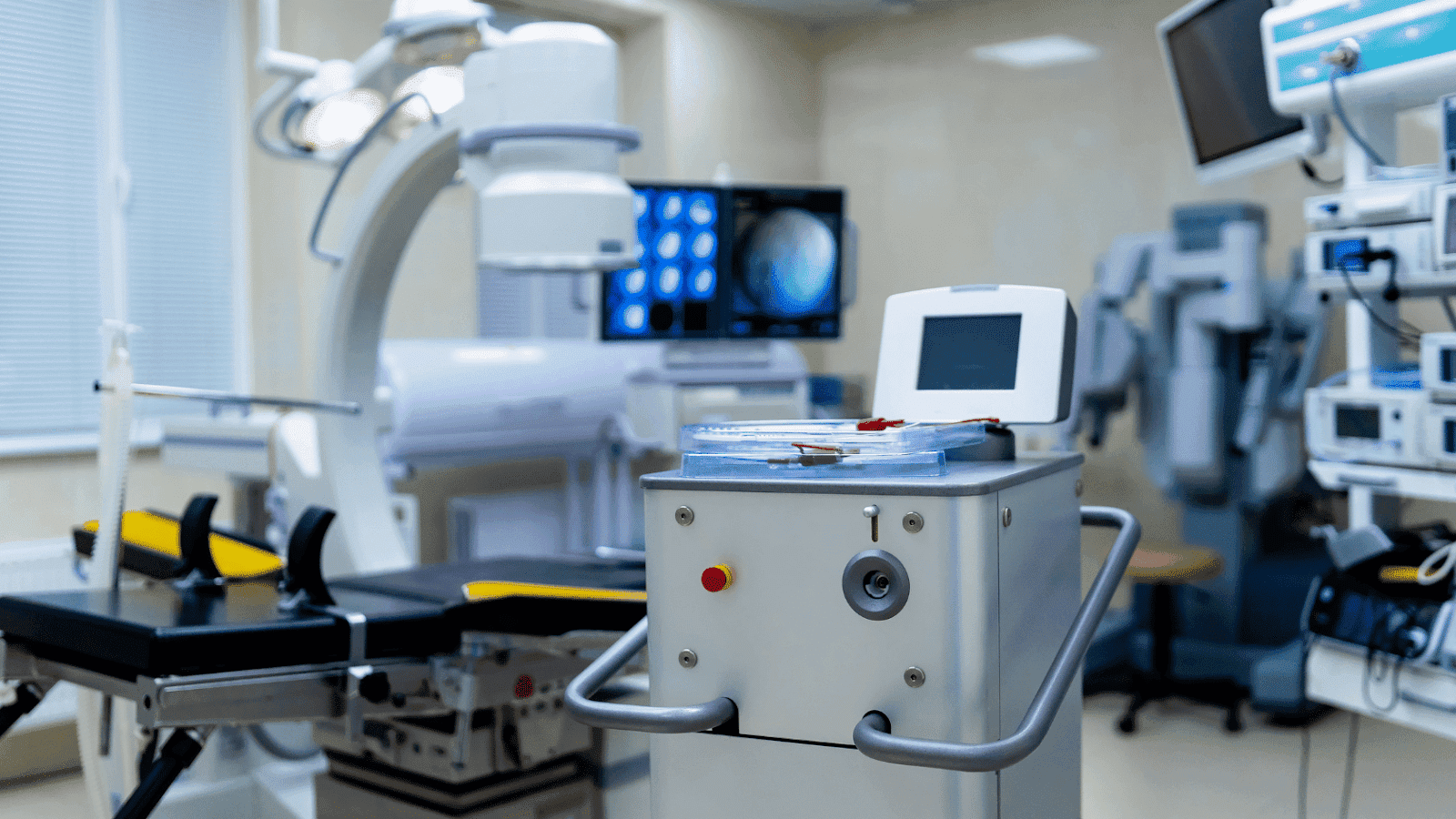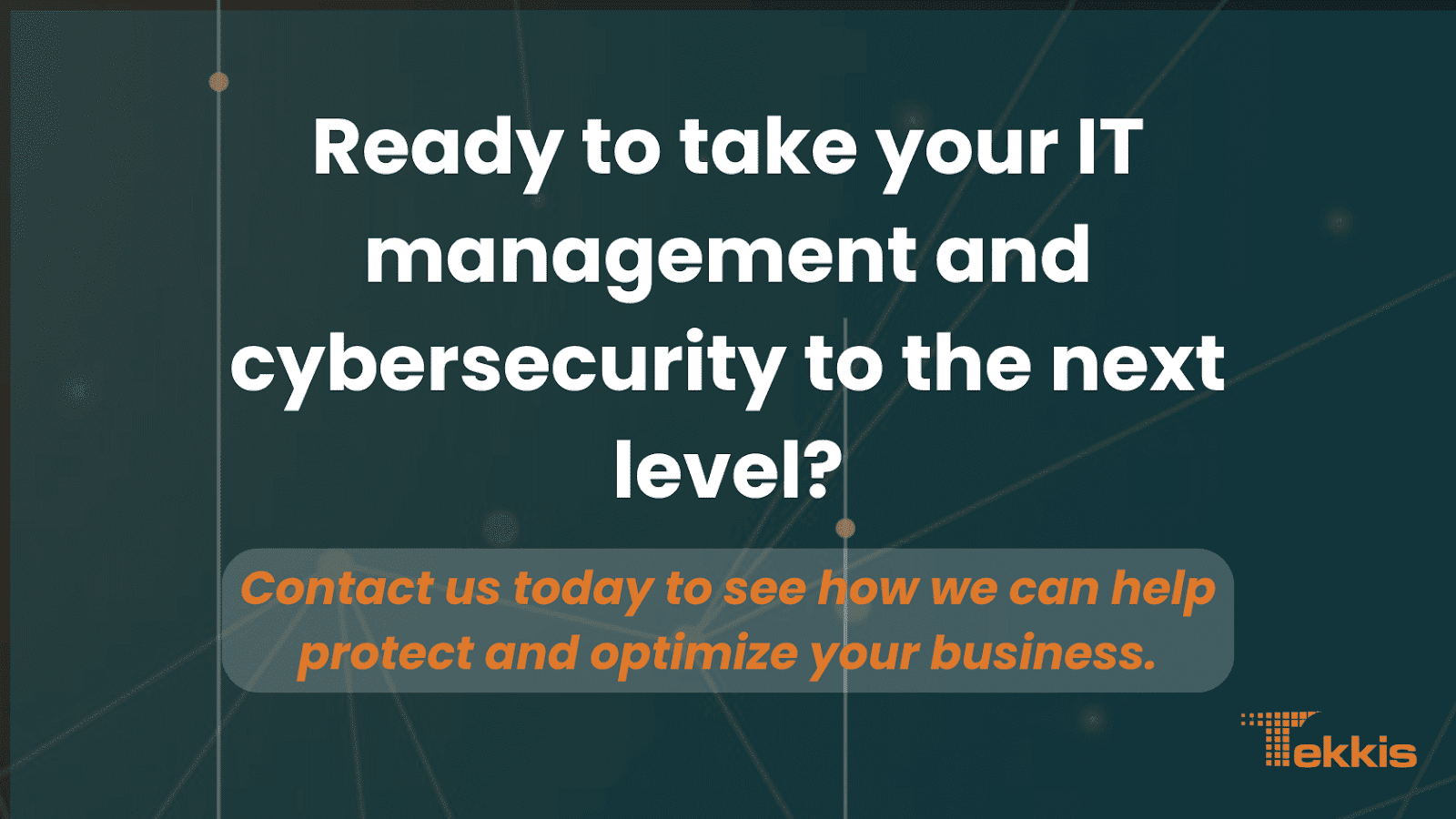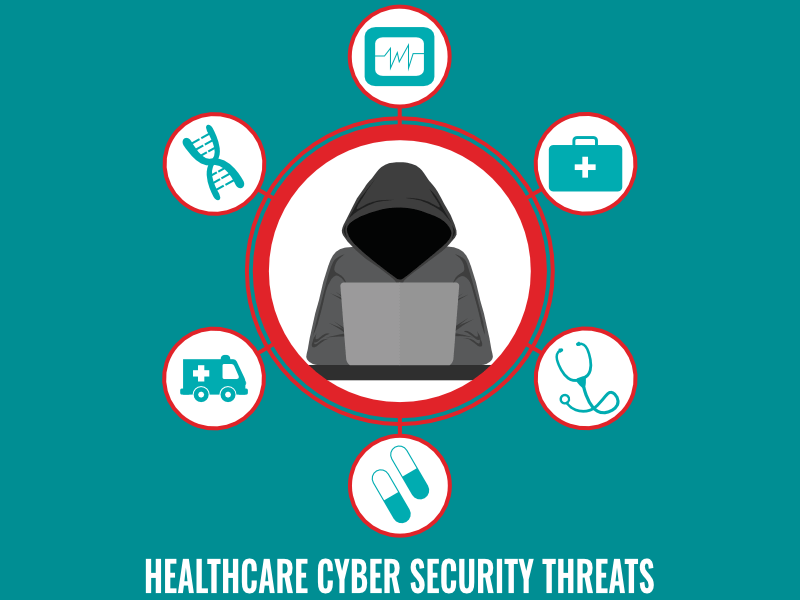Many global experts, such as KPMG, have reported that cybersecurity for healthcare will be a top concern for small—to medium-sized practices in 2025
This is not surprising, considering the past two years and the huge losses various businesses in the US have faced due to cyberattacks. Healthcare is a core part of the US economy, and considering what it protects, it is the most vulnerable to cyberattacks.
Therefore, small-scale healthcare companies such as clinics, hospitals, insurance providers, and others often wonder about healthcare cybersecurity.
At this point, it is important to create or revisit your organization's cybersecurity policy. This article will discuss cybersecurity in healthcare, why it is crucial, and how to secure it effectively.

What is the Importance of Cybersecurity in Healthcare?
Everyone in the healthcare sector is aware of regulations like HIPAA, which make it vital to protect patient data. Everyone realizes the importance of this protection, whether it is the people in the industry or the people (such as patients) interacting with the industry.
Even the hackers realize the importance of this data and understand what it means for healthcare organizations. Therefore, more and more cyberattacks occur on healthcare companies to lure money in return for their data.
The financial implications of these attacks are significant. The global healthcare cybersecurity market was estimated at USD 17.3 billion in 2023 and is projected to grow at a CAGR of 18.5% from 2024 to 2030. This rapid growth reflects the increasing investment in cybersecurity measures by healthcare organizations to protect against evolving threats.
Even minor breaches in the security of a healthcare organization can lead to significant losses. Many instances have occurred where small healthcare businesses had to shut down completely after being a victim of a cyberattack.
Therefore, ensuring proper cybersecurity measures is extremely crucial for businesses operating in the healthcare sector.

Who Is Affected By Poor Healthcare Cybersecurity Practices?
Many parties are affected by a poor cybersecurity setup in a healthcare company. Mainly, the parties that are at a loss in case of a cyberattack are:
Healthcare Company Executives
The C-level executives of a healthcare organization are responsible for the company's action plan. In the case of a poor setup that leaves open loops for cyberattacks, the blame falls on this very level.
If you are an executive or an administrator, it may seem unreasonable because, many times, healthcare cyber attacks occur due to the negligence of employees.
However, with a proper cybersecurity plan such as Tekkis healthcare cybersecurity protection, you get employee training as well. Therefore, as an executive, it is easy to avoid a cyberattack with the right strategy in place.
Healthcare Employees
As we just stated, it is common for untrained employees to leave open doors for cyberattacks. Most of the time, the employees responsible aren't even aware that a breach has occurred because of them.
Therefore, after a cyberattack, it is usual for employees to get fired as a method of placing the blame. It is vital for healthcare employees to be aware of healthy cybersecurity practices, not just to protect patient data but also to protect their jobs.
Patients
People value their privacy just as much as they value their healthcare. When a healthcare organization becomes a victim of a cyberattack, many of its patients lose faith and shift their business elsewhere.
In worst-case scenarios where the organization is at fault due to negligence, it can lead to potential lawsuits by the patients as well.
Healthcare Business Stakeholders
People who have invested in healthcare organizations are gravely affected by cyberattacks. A cyberattack aims to disrupt normal operations and causes heavy financial losses.
The business stakeholders have to bear these financial losses. In case there is a breach of patient data, the bad reputation can cause loss of business or even the complete shutting down of the healthcare organization.
Elements of Cybersecurity in Healthcare
When you are talking about healthcare cybersecurity, you need to protect multiple elements in your system. These elements include:
Physical System Access
Every system present in your healthcare facility is a potential entryway to your healthcare organization's network and data.
If any malicious entity gets physical access to these systems, they can view patients' private data and even plant gateways in the cyberinfrastructure for later access.
Therefore, there should be physical security measures in place to protect every device, be it a computer, laptop, or any other network-connected device.
Additionally, employees need to understand the importance of not leaving their devices unattended without locking them properly.
Wireless Network
Hospitals and clinics have WiFi networks, so all the devices on the premises can be simultaneously connected to the network. This enables seamless data sharing and synchronization across the organization.
However, without proper protection, these wireless networks are easy for hackers to tap, even without physically accessing any internal devices. Therefore, protecting these networks with appropriate protocols becomes vital.
Contact us to learn of our detailed Cybersecurity guide on how to protect your wireless network to learn more about these protocols.
Emails
Emails are the primary channel for communication and file sharing in healthcare businesses, regardless of their size.
While no one is going to breach your email network if you are using a reputable email service, it is still easy to gain access to private email communications. This occurs through a method known as phishing.
You can attend our free business cybersecurity webinar to understand how to protect against phishing and other cyberattacks.
Legacy Systems
Legacy systems are software services that have become outdated and are no longer supported by the manufacturer. Without manufacturer support and security patches, these are very easy targets for cyberattacks.
These systems can include an entire operating system or particular applications. They are widely present in healthcare organizations because upgrading applications can be expensive as it requires software purchases and employee training on the new systems.
Mobile Devices
Nowadays, most ERM software used by healthcare organizations comes with mobile connectivity for smartphones and tablets. Breaching the security of these devices is very easy. Therefore, you need to learn how to safeguard against these breaches.

Common Cybersecurity Threats in Healthcare
There are multiple threats to healthcare companies' cybersecurity. The severity and frequency of these threats have increased significantly in recent years. Between 2018 and 2022, the number of large breaches reported to OCR increased by 93%, from 369 to 712, with a 278% increase in large breaches involving ransomware. This alarming trend underscores the need for robust cybersecurity measures in healthcare organizations.
Ransomware Attacks
Ransomware is an emerging threat to US businesses in recent times. The instances of ransomware attacks have seen a surge in the last two years.
Healthcare ransomware attacks are also prevalent, so executives need to understand what they are before they take measures to protect against them.
In a ransomware attack, attackers infect the target systems and lock their data completely. The data isn't released until the healthcare organization pays a ransom to the attacker. If the ransom isn't paid, the data is publicly released in many cases.
The impact of ransomware attacks on healthcare organizations can be devastating. Ransomware attacks on healthcare organizations were predicted to quadruple between 2017 and 2020 and grow to five times by 2021. This prediction highlights the urgent need for healthcare organizations to implement robust cybersecurity measures to protect against such attacks. You can imagine what a nightmare this can be for any business, especially those in the healthcare sector.
Fortunately, Tekkis Cybersecurity has dedicated ransomware experts who can eliminate the possibility of ransomware attacks for current clients. For any business that has become the victim of a ransomware attack, Tekkis can provide their services to mitigate the risks and losses.
Phishing Scams
Phishing is the most common cyberattack in the healthcare sector. In phishing attacks, hackers redirect healthcare employees to fake websites that appear to be genuine.
When the employee enters their credentials on this fake website, these credentials are passed on to the attacker. They use these credentials to access the private user accounts of the healthcare organization, thereby accessing their data.
A very specific type of phishing attack is spear phishing, where the attack is designed to lure a specific employee.
Phishing in healthcare is generally done by sending fraudulent emails to the target(s). These emails appear to be genuine and might appear to be from a software vendor or the staff itself.
Insider Threats
While external threats are often the focus of cybersecurity efforts, insider threats pose a significant risk to healthcare organizations. These threats can come from current or former employees, contractors, or business associates who have authorized access to an organization's network or data. Healthcare suffered 2-3 times more cyberattacks in 2019 than the average amount for other industries, with insider threats being a significant contributor to this statistic.
Insider threats can be malicious, where an individual intentionally misuses their access for personal gain or to harm the organization. However, they can also be unintentional, resulting from negligence or lack of awareness about cybersecurity best practices.
To mitigate insider threats, healthcare organizations should implement:
- Strict access controls and the principle of least privilege
- Regular security awareness training for all staff
- Monitoring and auditing of user activities
- Robust offboarding processes for departing employees
HIPAA Compliance and Cybersecurity
Key HIPAA Requirements for Data Protection
The Health Insurance Portability and Accountability Act (HIPAA) sets the standard for protecting sensitive patient data in the healthcare industry. Key HIPAA requirements for data protection include:
- Implementing safeguards to ensure the confidentiality, integrity, and availability of all electronic protected health information (ePHI)
- Conducting regular risk assessments and implementing risk management strategies
- Establishing and enforcing policies and procedures for data access, use, and disclosure
- Providing ongoing security awareness training to all workforce members
Implementing HIPAA-Compliant Security Measures
To ensure HIPAA compliance, healthcare organizations should:
- Encrypt all ePHI at rest and in transit
- Implement strong access controls and authentication mechanisms
- Regularly update and patch all systems and software
- Establish a comprehensive incident response plan
- Conduct regular security audits and assessments

Emerging Technologies in Healthcare Cybersecurity
Artificial Intelligence and Machine Learning in Threat Detection
Artificial Intelligence (AI) and Machine Learning (ML) are revolutionizing healthcare cybersecurity by enhancing threat detection and response capabilities. These technologies can:
- Analyze vast amounts of data to identify patterns and anomalies indicative of cyber threats
- Automate threat detection and response processes, reducing response times
- Continuously learn and adapt to new threat vectors and attack techniques
- Enhance predictive capabilities to anticipate and prevent potential security incidents
Blockchain for Secure Health Data Management
Blockchain technology offers promising applications in healthcare data security:
- Immutable and transparent record-keeping for patient data and access logs
- Enhanced data integrity and traceability
- Improved interoperability and secure data sharing between healthcare providers
- Potential for patient-controlled health records, giving individuals greater control over their data
As healthcare organizations increasingly adopt these emerging technologies, it's crucial to balance innovation with security. The Colorado Department of Health Care Policy & Financing reported a breach in 2023 affecting 4,091,794 records due to a hacking/IT incident. This incident highlights the need for robust security measures even as organizations implement new technologies.
Cybersecurity Training for Healthcare Staff
Creating a Culture of Security Awareness
Developing a strong cybersecurity culture within healthcare organizations is crucial for maintaining data security. This involves:
- Fostering a sense of shared responsibility for data protection among all staff members
- Encouraging open communication about potential security risks and incidents
- Integrating security awareness into daily operations and decision-making processes
- Recognizing and rewarding good security practices
Regular Training and Simulations
Ongoing cybersecurity training is essential for maintaining a strong security posture:
- Conduct regular security awareness training sessions for all staff
- Implement phishing simulation exercises to test and improve staff vigilance
- Provide role-specific training for employees with access to sensitive data or systems
- Regularly update training content to address emerging threats and new security best practices
The importance of staff training cannot be overstated. In Colorado, a cyberattack affected the patient portal used for communication with providers, prompting Axis Health to follow its incident response protocol. Proper staff training can significantly reduce the risk of such incidents and improve an organization's ability to respond effectively when they occur.
Incident Response Planning
Developing an Effective Incident Response Plan
An effective incident response plan is crucial for minimizing the impact of a cybersecurity incident:
- Define clear roles and responsibilities for the incident response team
- Establish communication protocols for internal and external stakeholders
- Develop step-by-step procedures for detecting, containing, and mitigating various types of incidents
- Regularly review and update the plan to address new threats and organizational changes
Post-Incident Analysis and Improvement
After an incident, it's essential to conduct a thorough analysis to improve future response efforts:
- Document the incident timeline and response actions taken
- Identify what worked well and areas for improvement in the response process
- Update the incident response plan and security measures based on lessons learned
- Conduct additional training or awareness programs if necessary
The importance of a well-prepared incident response plan is evident in recent events. Axis Health System in Colorado, which operates 13 facilities, was targeted by a cyberattack claimed by the Rhysida ransomware gang, demanding over $1.5 million to unlock the data. A robust incident response plan can help organizations navigate such crises more effectively.

Healthcare IoT Security
Securing Connected Medical Devices
The proliferation of Internet of Things (IoT) devices in healthcare presents unique security challenges:
- Implement strong authentication and access controls for all connected devices
- Regularly update and patch IoT device firmware and software
- Segment IoT devices on separate networks to limit potential attack surfaces
- Monitor IoT device activity for anomalies or signs of compromise
Mitigating Risks in IoT Infrastructure
To address the broader risks associated with IoT in healthcare:
- Conduct regular risk assessments of IoT infrastructure
- Implement encryption for data in transit and at rest on IoT devices
- Develop and enforce policies for IoT device procurement, deployment, and retirement
- Educate staff on the proper use and security considerations of IoT devices
The scale of IoT-related security risks in healthcare is significant. Censys found 14,004 unique IP addresses exposing healthcare devices and data systems connected to potentially sensitive medical information on the public internet, with almost half located in the United States. This underscores the urgent need for robust IoT security measures in healthcare organizations.
Cloud Security in Healthcare
Best Practices for Secure Cloud Migration
As healthcare organizations increasingly move to cloud-based solutions, ensuring secure migration is crucial:
- Conduct a thorough risk assessment before migrating data or applications to the cloud
- Choose cloud service providers with strong security credentials and HIPAA compliance
- Implement strong access controls and multi-factor authentication for cloud services
- Encrypt sensitive data before uploading to the cloud
Ensuring Data Protection in Cloud Environments
Once data and applications are in the cloud, ongoing security measures are essential:
- Regularly audit cloud access and usage patterns
- Implement cloud security posture management (CSPM) tools to monitor and enforce security policies
- Ensure proper data backup and disaster recovery procedures are in place
- Maintain clear data ownership and responsibility boundaries with cloud service providers
The shift to cloud-based solutions in healthcare is accelerating, driven by the need for scalability and accessibility. However, this transition must be managed carefully to maintain data security and compliance. Healthcare organizations should prioritize cloud security as part of their overall cybersecurity strategy to protect sensitive patient information and maintain regulatory compliance.
Cybersecurity Compliance Standards for Healthcare
Beyond HIPAA: Other Relevant Regulations
While HIPAA is the primary regulatory framework for healthcare data protection in the United States, healthcare organizations should also be aware of other relevant standards and regulations:
- HITECH Act (Health Information Technology for Economic and Clinical Health Act)
- PCI DSS (Payment Card Industry Data Security Standard) for organizations that handle credit card payments
- GDPR (General Data Protection Regulation) for organizations dealing with EU citizens' data
- State-specific data protection laws, such as the California Consumer Privacy Act (CCPA)
Conducting Regular Security Audits
Regular security audits are essential for maintaining compliance and identifying potential vulnerabilities:
- Conduct annual risk assessments as required by HIPAA
- Perform regular vulnerability scans and penetration testing
- Review and update policies and procedures to reflect changes in the regulatory landscape
- Engage third-party auditors for independent assessments of security posture and compliance

How to Implement Healthcare Cybersecurity?
Handling cyber security in healthcare is not as difficult as you might have thought it to be. You don't even have to maintain any major portion of your budget for the same.
We realize that small businesses such as yours cannot maintain an internal cybersecurity team due to resource constrictions. Therefore, we have an alternative healthcare cybersecurity strategy for you:
Getting an Initial Consultation:
Before you spend any money on any service or software related to cybersecurity in healthcare, you need to know where you stand currently.
In this consultation, a top cybersecurity professional will get in touch with you to discuss your needs. Tekkis also provides a free limited demo along with a detailed report of the findings.
Security Controls
Once you are through with the consultation, you will have to implement the various security controls that Tekkis suggests. If you are a busy organization with no time to spare, Tekkis can assist you with the implementation as well.
Some of the common security controls that Tekkis utilizes for healthcare organizations are:
Employee Training
Employee training is the spinal element of any cybersecurity initiative. Regardless of how high-end security measures you use, if your employees aren't trained, it all becomes worthless.
Employees who understand the basics of cybersecurity can easily differentiate between genuine workflows and suspicious attack signals such as phishing emails.
The good part is that you do not have to host seminars or send your employees to conferences. The cybersecurity experts at Tekkis can easily provide webinars, educational sessions, and informational manuals to your employees.
Security Software
Antivirus and firewall software might seem overstated, but it is so because of how important they are. However, we aren't talking about the common applications that you find on the internet. The popular solutions are one-size-fits-all solutions.
What you need are tailored security solutions that fit your network perfectly without wasting any resources and without leaving any open loops.
Tekkis provides the perfect blanket in this regard, providing you with self-designed, tailored security suites that are impossible for attackers to crack.
Access Controls
Many executives miss out on access controls, leading to anonymous attacks due to internal malicious elements of the organization.
With access controls, you give each employee the exact permissions they require, nothing more and nothing less. Access controls also make it easy to take these permissions away from a person with a single click once they leave your organization.
File Encryption
Healthcare cybersecurity calls for proper file encryption measures not only to protect data from hackers but also to maintain HIPAA compliance.
Surprisingly, file encryption protocols in most healthcare organizations are either poor or altogether absent.
Tekkis works in this regard to provide the highest level of file encryption at each stage of file storage.
Disaster Recovery Plan
Good cybersecurity measures can shield you against cyberattacks. However, nothing can shield you from accidents that happen inside the organization. These accidents might be due to human error or technological issues.
It is common for storage systems to get corrupted or for cyber infrastructure to fail entirely. What will you do in this case, and how will you gain access to your data again?
Foreseeing these issues, Tekkis also provides healthcare organizations with a disaster recovery plan that can be automatically deployed when disaster strikes.
Besides these security controls, Tekkis provides many other defense measures as well. To get a clearer understanding, you can request a callback from the Tekkis Cybersecurity team.

Conclusion
A decade or two ago, it was possible to overlook the importance of cybersecurity in healthcare. Back then, not all data was digital, and many devices weren’t connected to networks. However, the landscape has dramatically changed. Today, the Internet and electronic medical records (EMR) are integral to healthcare infrastructure.
As a result, prioritizing cybersecurity is essential for the uninterrupted functioning of your organization. The urgency of implementing robust cybersecurity measures cannot be overstated. In 2023, the global healthcare cybersecurity market was valued at USD 17.3 billion, with projections indicating a remarkable growth rate of 18.5% from 2024 to 2030. This rapid expansion highlights the increasing awareness of cybersecurity’s crucial role in protecting patient data and ensuring the continuity of healthcare services.
Don’t wait—talk to a Tekkis expert today and discover a comprehensive solution for all your cybersecurity needs!



